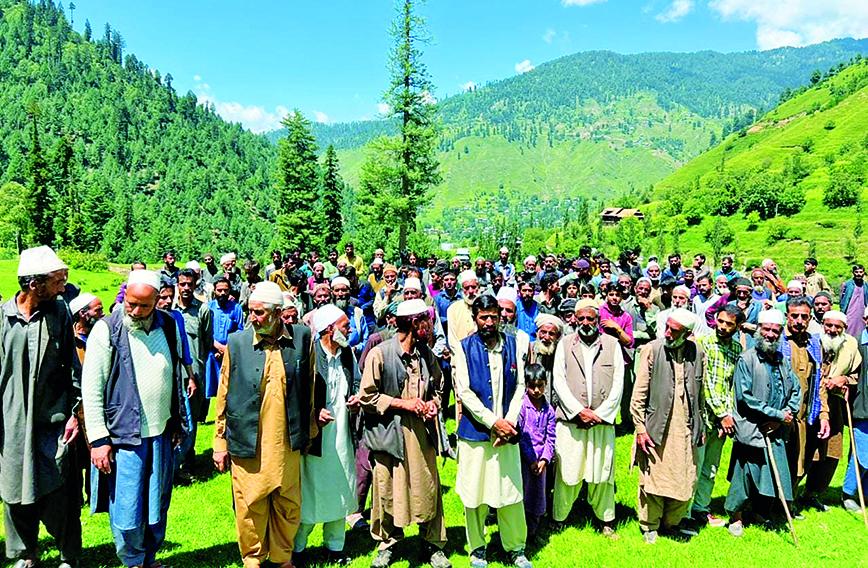
The gram sabha of Kalaroos Kupwara standing on village pasture land
Give us our forests, say gram sabhas
Jehangir Rashid, Srinagar
Fifteen panchayats in the Kashmir Valley have passed resolutions declaring forests in their vicinity as ‘community’ forests, in line with the Forest Rights Act (FRA) of 2006. The government has reacted with complete silence — leaving the gram sabha decisions impossible to implement. This has irked villagers and forest rights activists.
“When a gram sabha declares a forest to be a community forest, it means that the local community takes ownership and management control of that forest. The gram sabha is a village-level democratic institution in India. It has the power to declare forests as community-owned and determine how they will be managed and used,” says Dr Shaikh Ghulam Rasool, founder and chairperson of the J&K Forest Rights Coalition.
He spells out the benefits that would accrue to villagers and to Scheduled Tribes (STs) like the Gujjar and Bakarwal communities who are nomadic herders of sheep and goats dependent on pastures and forests for grazing their herds.
Once a forest becomes a community forest, it would ensure the preservation and protection of the traditional rights of such ST communities, which have historically been dependent on forests for their livelihoods, cultural practices and sustenance.
Zahid Parwaz Chaudhary, convener of the J&K Forest Rights Coalition, who is also the president of the J&K Gujjar Bakarwal Youth Welfare Conference, explained that decisions taken by the gram sabha are binding on all. The government has to facilitate the implementation of the gram sabha decision.
“It is highly disturbing that instead of the tribal department, the forest department has been made the nodal agency for implementation of the FRA in J&K. It would have been better if a separate department had been created. There is a provision in the Act that stern action can be taken against officers or officials who do not implement the decision of Forests Rights Committees (FRCs) when it also declares a forest as a community forest,” said Chaudhary.
Some of the panchayats which had passed the resolutions are Mujpathri-Budgam, Kawari-Lolab Kupwara, Doodmarg-Tral, Naristan-Hajen Tral-Pulwama, Darde-Woeder Mamer-Kangan, Ganderbal, Mathi-Gawran, Anantnag, Preng-A, Wangat-A and Danew Kandi Marg-C, and Kulgam.
“Having community forests will ensure that the rights of STs over forest resources, such as grazing, collection of non-timber forest produce and access to water sources, are recognized and protected. This would lead to sustainable use of forest resources, conservation of bio-diversity, maintain ecosystems and promote long-term benefits for the community,” emphasized Dr Rasool.
It would also enable ST communities to actively participate in decision-making, manage their resources, and exercise autonomy in their communities. It fosters a sense of empowerment and helps address social, economic and political issues affecting the tribe, said Dr Rasool.
Community forests provide avenues for livelihood activities such as forest-based industries, eco-tourism and sustainable agriculture. Economic opportunities are created that improve the overall well-being and socio-economic conditions of the ST community.
Tracing the origin of the J&K Forest Rights Coalition, Chaudhary said that soon after District Development Council (DDC) elections in 2018, an eviction drive against ST families was carried out by the authorities in Lidroo village near Pahalgam. He visited the area and filmed a video that went viral on social media.
“As soon as I uploaded my video there was a buzz on social media. Former chief minister and People’s Democratic Party (PDP) President Mehbooba Mufti visited the area. I got in touch with Dr Shaikh Ghulam Rasool and we decided to work for the ST people with the FRA as our guiding force,” said Chaudhary.
Soon after the Forest Rights Coalition was formed, panchayats were asked to convene gram sabhas to elect Forest Rights Committees (FRCs) in 2019. Training was provided to FRCs as well as the employees of forests, revenue and rural development departments. The coalition members carried out a sustained campaign across Kashmir to ensure an end to the harassment and eviction of STs.
“We held awareness camps, consultations and workshops at collective and individual levels across the Kashmir Valley. In the beginning not many people joined us but as time passed we were able to attract maximum public participation,” said Chaudhary. He said that action can also be taken against any member or members of FRCs if it is found that they are not implementing the decisions taken by the gram sabha.
“Since the people of the community are the real custodians of the forests we are sensitizing them about the need to preserve the forest cover. Our sustained campaign has yielded positive results since there has been a regeneration of the forests. We want the government to be proactive,” he said.
The J&K Forest Rights Coalition has been receiving calls from ST members in the Jammu region, seeking education about the FRA. Even though resources are limited, they are all set to visit villages in the Chenab valley, Pir Panjal range and Reasi district.
Dr Rasool believes that political turmoil has prevented implementation of socio-economic legislation like the FRA in J&K. Law-makers seem to be less enthused about empowering people belonging to STs, he says.
Mian Amjad Baji, District Development Council (DDC) member, was present during the gram sabha meeting at Wangat-A, Kangan Panchayat in Ganderbal district when the resolution declaring the local forest as a community forest was passed. Amjad, along with the other participants, exuded confidence that a day would come when they would be given their due rights and they would become the real custodians of the local forests.
Comments
Currently there are no Comments. Be first to write a comment!



